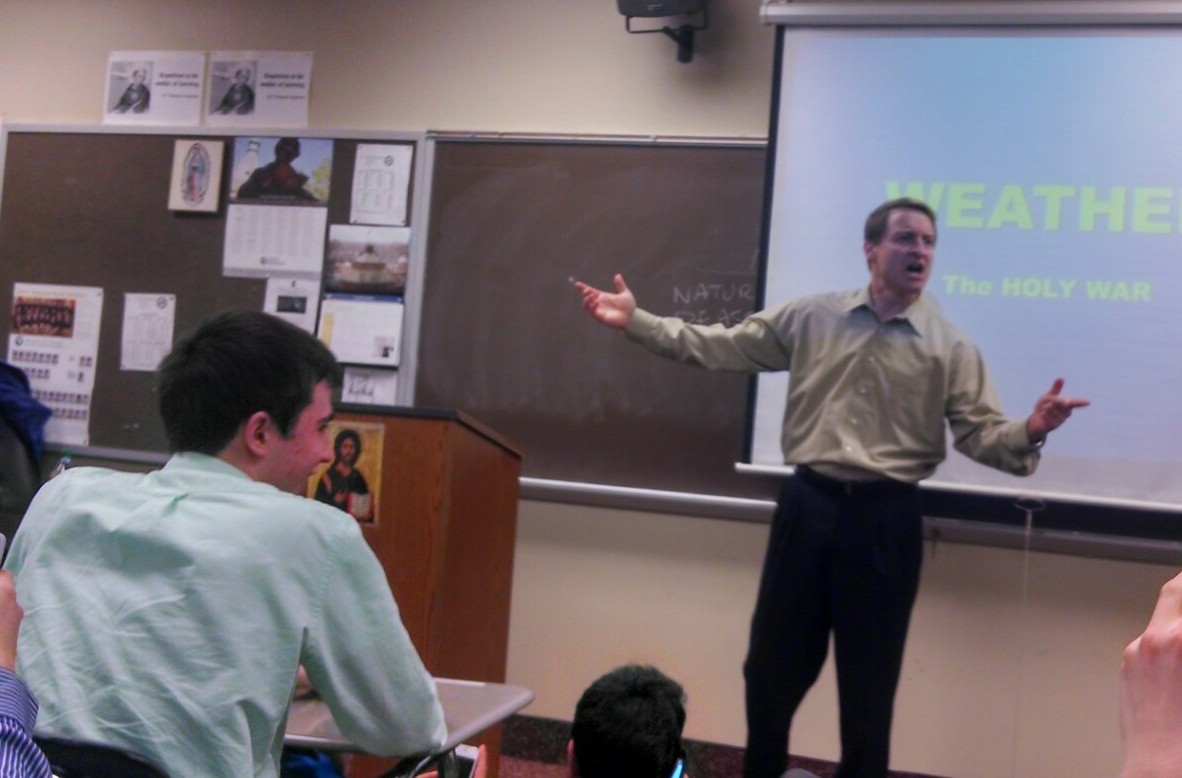by Patrick Millican ‘15
On Monday, NewsChannel 5’s chief meteorologist Mark Johnson spoke about climate-change skepticism in Mr. Dybicz’s room after school. In his speech, he made the case for skepticism in the theory of “manmade and catastrophic global warming.”
Attendance was well in excess of the fifty-man target Mr. Dybicz hoped for. So many students were packed into the room for the Conservative Union-sponsored speech that windowsills and backpacks became impromptu seats for members of the audience. Such a high turnout was possibly due to Mr. Johnson’s significant social-media presence and willingness to interact with many of his 20,515 Twitter followers.
Mr. Johnson began his speech by asking students if they knew what the scientific method was and placed special emphasis on the scrutiny necessary when vetting scientific conclusions. Throughout his speech, he repeated the phrases, “Show me the data!” and “Don’t believe me; do the research on your own” to emphasize that his conclusions–and those of scientists generally–need to be based on evidence.
His argument was threefold: He set out to prove that Earth was not warming (at least not as fast as scientists predicted it would), that global warming wasn’t manifesting itself in extreme weather, and that the methodology of many studies purportedly proving global warming are less valid than many think. To these ends, he showed charts detailing the adjustment of yearly temperature data by NASA so that it would fit the climate-change narrative, hurricane and tornado data that showed no upward trend in frequency, a British court case in which nine errors were declared to be in Al Gore’s movie An Inconvenient Truth, and a chart detailing the progress of the global average temperature against what many experts predicted it would be. Furthermore, he brought up several studies (such as those involving the famous hockey-stick graph, Arctic ice cores, and Baffin Bay lichen samples) and made the case that their methodology and findings were inaccurate.
For a topic normally charged with emotion, however, tensions ran low in the discussion of climate change and audience members’ queries. Students, for the most part, asked Mr. Johnson more neutral questions, while teachers tended to challenge.
For example, Andrew Beddow ‘14 asked him what he believed the source of the alarmism on the other side of the climate-change aisle is; his best guess was that alarmist scientists were simply inaccurate and pessimistic in their outlook.
Zach Fechter ‘15 asked whether a carbon tax was a viable means of reducing CO2 emissions; the answer was no.
US History teacher Mark Pecot ‘91 asked Mr. Johnson whether the motivation for his skepticism is ideological; the reply was that it was not, since Mr. Johnson calls himself “very liberal on some issues and very conservative on others.” Pecot went on to cite studies that showed that the overwhelming majority of climate-change scientists and research supports manmade global warming, which Mr. Johnson disputed.
Later on, AP Biology teacher Mr. Bogen disputed Mr. Johnson’s use of only American statistics as opposed to those of other countries.
All in all, the speech and ensuing discussion was without real conflict. For Mark Johnson’s part, he said shortly after the presentation ended that it was “exactly what [he] was hoping for,” and later that day tweeted that it had been a “Great conversation” and a “Great debate!”
Great time talking with students and faculty at St. Ignatius today. Great conversation. Great debate!
— Mark Johnson (@MarkJWeather) January 27, 2014
Our upcoming print edition will feature both an editorial comment and fact check on Mr. Johnson’s talk.






